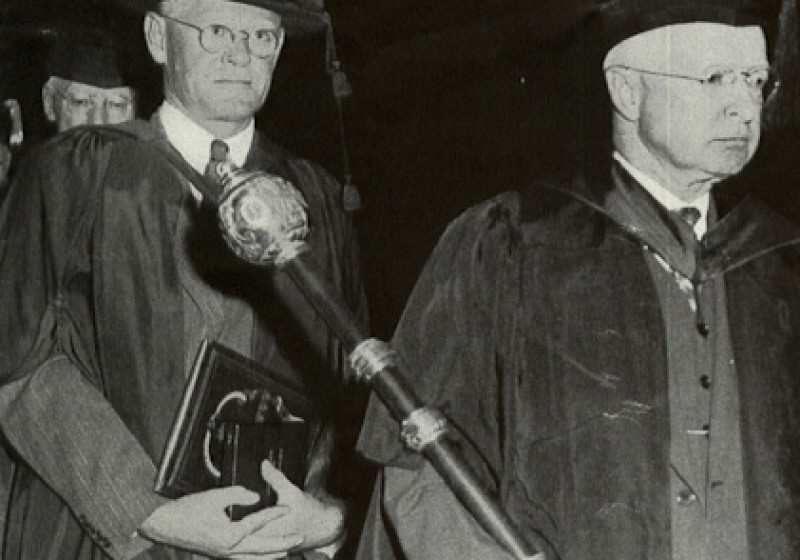The four-foot mahogany and silver pole—bedecked with the University seal, past University presidents’ names and dandelion designs—is a symbol of the graduation ceremony. The UR commencement brochure states that “the mace has become a symbol of authority and dignity in academic ceremonies.” But, its carrier, the University grand marshal, is also a symbol of authority and dignity in academia.
Robed while sporting a colorful hood and stole, the University marshal is as symbolic as the mace itself, leading a procession of soon-to-be college graduates down the Eastman Quadrangle while carrying the mace. Since 1990— save the 1994 graduation— Professor Emeritus of History Jesse T. Moore carried the mace. Following his passing last month, Dexter Perkins Professor in History Joan Rubin will be the new grand marshal, carrying the mace and leading president Joel Seligman as well as the procession of faculty, trustees and students.
Moore is certainly a symbol of authority and dignity in the tradition of University marshals. Having carried the mace in 23 graduation ceremonies between 1990 and 2014, Moore is certainly emblematic of this tradition. He is seconded by Professor of Chemical Engineering Richard Eisenberg in terms of the number of graduations presided over. Eisenberg carried the mace between 1973 and 1987.
Each are members of an exclusive group of one of approximately 11 professors who have carried the mace since it was commissioned and first used in 1935.
As University Dean, Vice President, and Senior Advisor to the President Paul Burgett described, “the marshal is the ceremonial point-person for the commencement exercise.”
But, more important than just as a point-person, Moore was a mentor, a figurehead and emblematic of the University’s legacy. Few are more familiar with that reality than Burgett.
Burgett met Moore in the early 1970s while working on his dissertation at the Eastman School of Music. As the only African- American faculty member at the University, Moore was able to provide the then-doctoral student Burgett with readings on history and philosophy that expanded the strength of his dissertation on the aesthetics of music of African- Americans. As Burgett recalls, after the dissertation defense, “Professor Moore […] extended his hand and said, ‘Congratulations, Dr. Burgett,’” becoming the first person to call Burgett by his new title.
Beyond the important connection Burgett formed with Moore, his interaction with the new Dr. Burgett perhaps reflects Moore’s respect for the tradition associated with academia; “bestowing” Burgett with his new title, in a sense, reflects the similar passion Moore demonstrated years later when he first served as University marshal in 1990.
“He loved the University so much, and being able to be the marshal of the institution meant […] so much to him,” Burgett said.
Moore’s commitment was unwavering. Even after officially retiring, he continued to carry the mace at graduations. When the graduation ceremony was divided from one large ceremony on Fauver Field into a general ceremony and eight school-specific ceremonies soon after Seligman became president, Moore carried the mace for all of them.
“I don’t know how he did it, but he loved it,” Burgett said.
Before each commencement, as faculty donned robes, caps and stoles in Schlegel Hall, Moore was known to deliver his trademark “inspirational soliloquy,” as Burgett described it, on the importance of the academic experience and the ceremonial trappings that brought students’ academic years to their conclusion.
“We all felt really good about what we were about to do,” Burgett said, describing the start of the commencement procession which followed Moore’s speech.
It was at one commencement, soon after President Seligman assumed the role, that Burgett recalls a special title given to Moore. As Burgett recounts, Seligman said, “Professor Moore, you’re not just the University Marshal, you’re the grand marshal.”
And so the terminology of grand marshal was born, and with it a heightened awareness of the unique and prestigious role Moore played. The tradition in which this year’s grand marshal will be stepping is not lost on the faculty member who will fill it, professor Joan Rubin.
“I’m well aware of what an honor [it] is,” Rubin said. “It’s tinged with sadness because Professor Moore was marshal for many, many years. I can’t fill his shoes. I am very cognizant of the tradition in which I’m going to be serving.”
Like Moore, Rubin shares a love of academic traditions.
“It’s my love of academic rituals that got me into [commencement] in the first place,” she described. “I like the rituals of commencement, and I love the part when we lead the procession of students through the faculty line. They cheer for the students who of course deserve the cheers of the faculty.”
Rubin laughed, exclaiming that, despite her love of the ceremony, she’s nervous for this year’s ceremony. She will not only carry the mace and lead the procession, but will also hood the honorary degree recipients and sit on the platform for the ceremony.
There is no doubt she’s prepared: “I’m sprucing up my cap and gown and putting another hook in it,” she said. “I’m going to bobby pin my cap to my head.”
Beyond the humorous practicalities are the accomplishments that likely led Rubin to selection by Provost and Dean of the Faculty of the School of Arts, Sciences and Engineering Peter Lennie: Rubin is the newly appointed Director of Humanities, has spent the last two years as chair of the steering committee of the Faculty Council in the School of Arts, Sciences and Engineering and has served as a “faculty marshal” in the commencement ceremony for the last four years.
She also takes her role seriously, stating that “I do feel that I have large responsibilities, and I want to make sure that I carry them out.”
Beyond the commencement ceremony itself, Rubin also has fond memories of Moore, the figurehead into whose role she is stepping. Both professors in the History Department, Rubin met him in her first days working at the University.
“He was very kind to me when I first arrived and ever since,” she said.
In some ways, though, Moore’s legacy will be unmatched.
“We simply thought of Professor Moore as the marshal, and it just continued, year-in and year-out,” Burgett said.
Now, each school selects a marshal that will lead their ceremony, appointed for a period of one to three years. Rubin will serve this year as the University marshal at the general ceremony.
“He was a very kind and thoughtful person, who loved the university, loved students and was absolutely the right person to be university marshal for so many years,” Rubin concluded. Now, as she steps into his shoes, she continues Moore’s legacy of love for academic ceremony and appreciation for the University.






